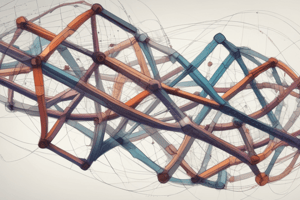Podcast
Questions and Answers
What is a group in algebra?
What is a group in algebra?
A group is a set of elements combined into one whole by an operation, which can be closed, associative, and have an identity element and inverse elements.
Define a field in algebra.
Define a field in algebra.
A field consists of a set of numbers or symbols that follow rules similar to those of the real number system, including addition, multiplication, subtraction, division, distributive property, and the existence of zero and one.
What are the key properties of addition and multiplication in a ring?
What are the key properties of addition and multiplication in a ring?
Addition in a ring must be associative, and both addition and multiplication must be commutative.
How does algebra interact with the concept of fields?
How does algebra interact with the concept of fields?
Explain the role of algebra in determining the value of variables.
Explain the role of algebra in determining the value of variables.
What is the role of the additive identity in algebra?
What is the role of the additive identity in algebra?
Explain the significance of lattices in mathematics.
Explain the significance of lattices in mathematics.
How are modules defined in algebra?
How are modules defined in algebra?
What are the key characteristics of vector spaces in algebra?
What are the key characteristics of vector spaces in algebra?
How does algebra serve as a powerful tool in various fields?
How does algebra serve as a powerful tool in various fields?
Flashcards
Algebra
Algebra
A branch of mathematics that uses symbols to manipulate and solve equations involving variables.
Groups
Groups
A set of elements combined by an operation that's closed, associative, has an identity, and inverses.
Fields
Fields
A set of numbers following addition, multiplication, etc. rules similar to the real numbers.
Rings
Rings
Signup and view all the flashcards
Modules
Modules
Signup and view all the flashcards
Lattices
Lattices
Signup and view all the flashcards
Vector Spaces
Vector Spaces
Signup and view all the flashcards
Study Notes
Algebra
Algebra is a branch of mathematics dealing with symbols and their manipulation. It involves solving equations and determining the value of variables through various techniques such as substitution, elimination, and cross-multiplying. There are several types of algebraic structures including groups, fields, rings, modules, lattices, vector spaces, and more. Algebra also provides the fundamental tools required for studying structures like commutative rings, unique factorization domains, and integral domains. Here's a brief overview of how algebra interacts with these mathematical concepts:
-
Groups: A group is a set of elements combined into one whole by an operation, which can be closed, associative, and have an identity element and inverse elements. In algebra, we often represent these operations mathematically using functions.
-
Fields: A field consists of a set of numbers or symbols that follow rules similar to those of the real number system, including addition, multiplication, subtraction, division, distributive property, and the existence of zero and one. For example, the rational numbers Q, complex numbers C, and the real numbers R form fields under addition and multiplication.
-
Rings: A ring is a set of elements combined into one whole by two binary operations, typically called addition and multiplication. Addition must be associative, and both it and multiplication must be commutative. Additionally, there exists an element denoted '0', called the additive identity or neutral element. This element combines with any other element to result in itself when added.
-
Modules: A module is a generalization of a ring and contains the properties of being an abelian group and having a compatible scalar multiplication over a ring. Modules have applications across different branches of mathematics, from linear algebra to topology.
-
Lattices: Lattice theory deals with partially ordered sets where every pair of elements has a supremum (called least upper bound) and infimum (also called greatest lower bound). These concepts are essential in understanding the structure of mathematics and provide a foundation for the study of logic and Boolean algebra.
-
Vector Spaces: Vector spaces are collections of vectors that follow specific rules such as closure, associativity, and distributivity. They find extensive use in physics and engineering due to their ability to model relationships between physical quantities.
In summary, algebra is a powerful tool used to understand the structure and relationships within mathematical systems. Its principles allow us to analyze, solve problems, and make predictions in areas ranging from physics to computer science.
Studying That Suits You
Use AI to generate personalized quizzes and flashcards to suit your learning preferences.





